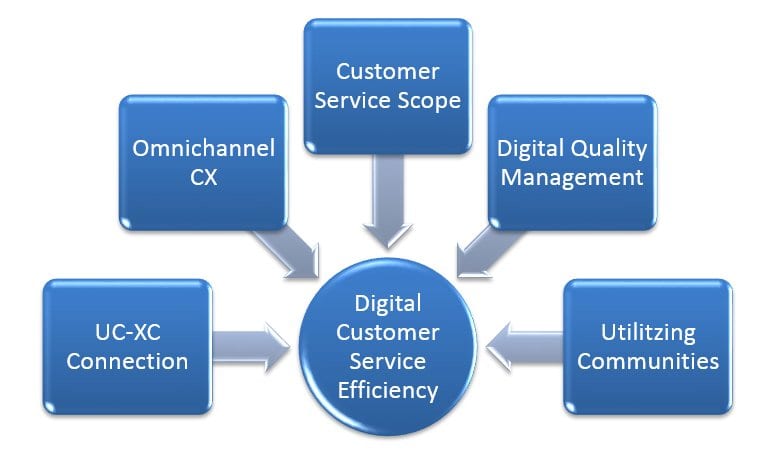
Today, digital innovations have sparked a transformation in the rules of customer engagement, a new age of customer service being driven by the customers, themselves. To continue successfully serving, acquiring and keeping customers, companies need a fresh approach in order to develop and maintain the efficiency of their digital customer service, one that drives brand loyalty with happy, satisfied customers who keep coming back.
In fact, according to the 2016 Microsoft State of Global Customer Service Report1, 97% of global consumers say digital customer service is important in their choice of, and loyalty to a brand. However, when the companies don’t properly optimize the efficiency of their customer service, they risk losing big. Here are five keys in 2017 to digital customer service efficiency:


Understanding the UX-CX Connection
The user experience (UX) is traditionally defined as the overall experience engaging with a particular product, website, software application, etc. In this digital age, where customers may use multiple channels throughout their buying journey, the user experience has a clear influence on the customer experience, which is essentially the sum of all interactions between a customer and brand. If your UX is optimized and efficient, your CX is likely to be as well. On the other hand, when the user experience is poor because some tools on your website aren’t working properly, this negatively impacts the customer experience and can lead to an unnecessary strain on your customer service. Delivering a consistent user experience can help customer service to craft the right customer experience across various products and digital touch points.
Optimizing Omni-Channel CX
Today, in the age of digital innovation, more than 60% of customers will utilize multiple channels on their customer journey, no matter the place, time or device. As a result, Omni-channel support was born to accommodate this new multi-channel customer experience. However, unlike “multichannel” support which implies many channels, and which often leads to a fragmented customer experience, “Omni-channel” support implies many consistent channels, so the customer can flow across as many channels as necessary and customer service can pick up the conversation anywhere with total visibility into the customer’s history. An Omni-channel customer service approach ensures operational effectiveness by enabling different support touch points to work together in unison, thus facilitating the customers’ preferred journey and increasing customer engagement.
Expanding the Scope of Customer Service
One of the ripples of Omni-channel digital support is the blurring of the lines of what traditionally separated customer service from marketing or sales. Customers don’t care how their question is categorized, they just want answers, and quickly. While the necessary technical resources to quickly and efficiently relate to all types of customer’s questions are obviously crucial, such as live chat application tools, toggle screens, quick account lookups, etc., today service teams need to be equipped as well with an expanded arsenal of communication skills to optimize operational effectiveness at all stages of the customer experience. Today, customer service teams have been transformed into brand reps which must be backed up with the right training and the right metrics to drive relationship-building behavior.
Digital Quality Management
One of the challenges of offering digital experiences on a wide variety of engagement platforms and touch points is the growing challenge and cost of ensuring consistency while preventing errors which can ruin a brand’s reputation. The bottom line is you can’t manage what you don’t measure. Digital Quality Management is a holistic solution which offers comprehensive visibility into your digital world, so you can see what is occurring across your digital assets at any given moment based upon monitoring criteria. It can then offer actionable insights to better track and report on activity and prevent problems before they materialize. Furthermore, the business analysis of Digital Quality Management enables measurable goals that can help your service team to meet the set standards of your desired customer experience.
Utilizing Customer Communities
Today, an online customer service community has become a major weapon in effective digital customer service and strategic planning. Online communities are an opportunity to build an independent customer service platform that helps you quickly provide customers with solutions to their problems, all while building customer trust and loyalty. Once that trust is established, engagement is usually self-sustaining because users are always asking questions as well as sharing helpful insights. As a result, this helps to decrease your call volume and contact center spending, thus optimizing call center management so you can scale your customer service. At the same time, companies should be involved in reviewing and directing online community dialogue, utilizing this forum to provide useful content and proactively address customer service concerns and issues.
Achieving efficiency in your digital customer service is a process that requires knowledge, focus and action. Keep these tips in mind, and you’ll be on your way.
[About the author]

1 Net Promoter Score ® is a customer loyalty metric developed by Fred Reichheld, Bain & Company and Satnmetrix. Net Promoter Score is a registered Trade Mark. https://info.microsoft.com/dynamics365-global-state-cust-service-en-gb.html

